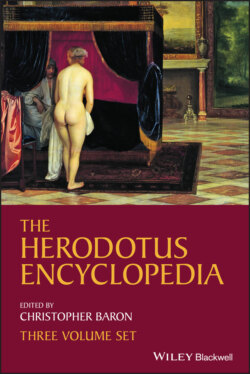Читать книгу The Herodotus Encyclopedia - Группа авторов - Страница 518
ARAXES RIVER (ὁ Ἀράξης ποταμός)
ОглавлениеCHRISTOPHER BARON
University of Notre Dame
A major river of the CAUCASUS, over 650 miles long (BA 88, 89, and 90), modern Aras or Araks. The Araxes arises in eastern Turkey and flows along the southern side of the Lesser Caucasus mountains. It forms the southern borders (modern) of Armenia and Azerbaijan before joining the Kura River in the latter country, which empties into the CASPIAN SEA about 100 miles south of Baku. For Herodotus, the Araxes represents one potential border between EUROPE and ASIA (4.40.1), though at times he appears to confuse it with the Oxus or Jaxartes Rivers in Central Asia (e.g., 4.11.1).
The Araxes forms a crucial physical and metaphysical boundary in Herodotus’ narrative of the final campaign of the Persian king CYRUS (II), against the MASSAGETAE c. 530 BCE (1.201–14). When Cyrus attempts to bridge the river, the Massagetan queen TOMYRIS offers him the option of choosing which side of the river he would like to fight on. On the advice of CROESUS (and against that of his own generals: cf. 3.36.3), Cyrus elects to cross over the Araxes—thus from Asia into Europe—and fight in enemy territory. After a DREAM in which he sees DARIUS I on the Persian throne, Cyrus dies in battle against the Massagetae. Though Herodotus does not explicitly emphasize it here, the disastrous consequences of violating a “natural” boundary foreshadow the fates of Darius and XERXES.
However, the river at the center of this conflict cannot be the Araxes: Herodotus places the Massagetae east of the Caspian (1.204.1), but elsewhere (1.202.3; 4.40.1) he clearly describes the modern Aras River in the Caucasus. The first of those descriptions accompanies a brief ETHNOGRAPHY of the peoples who live on large ISLANDS in the river or in the swamps around its mouth (Herodotus shows no knowledge of the Kura River, and his story of all but one of the forty mouths ending in the swamps may reflect garbled information about the Volga: How and Wells 1912, 1: 152). He portrays abundant plant and animal life, though the people lead a primitive existence. Similarly, the Massagetae enjoy abundant FISH from the river (1.216.3).
SEE ALSO: Boundaries; Conquest; Geography; Persia; Rivers
